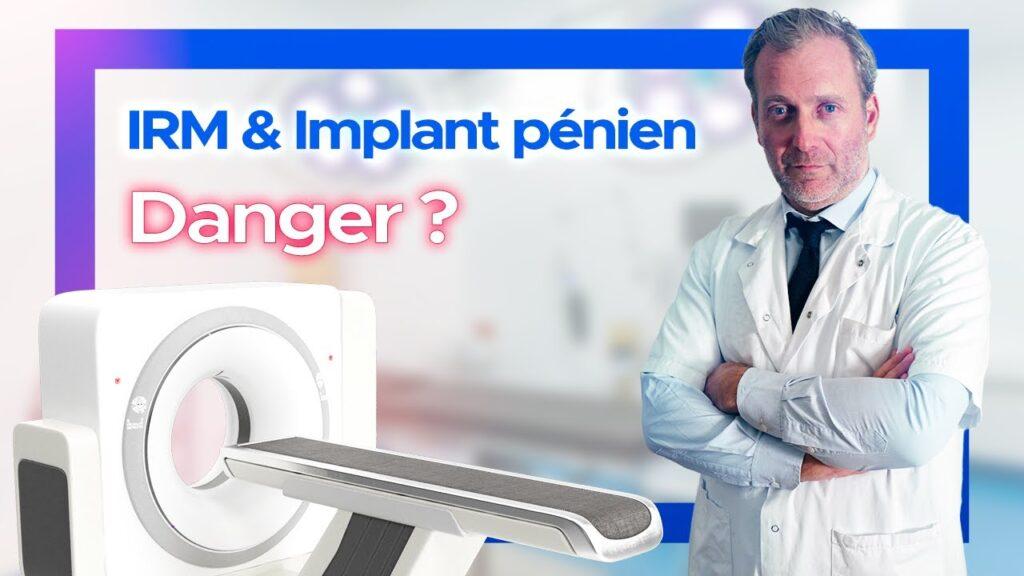I’m Dr. Sébastien Beley, urological surgeon and andrologist in Paris, and today I’d like to answer a question I’m often asked by my patients: can I have an MRI scan when I have a penile implant? This is a legitimate question, especially for men considering regular medical follow-up, such as prostate cancer. In this article, I’ll explain in detail why penile implant and MRI are not incompatible, and what this means for your medical follow-up.
What is a penile implant?
An implant is an implantable medical device designed to treat severe erectile dysfunction when medication is ineffective or unsuitable. It is a surgical solution that allows men to regain satisfactory erectile function, thus improving their sexual quality of life and psychological well-being.
There are two main types of penile implants:
- Inflatable implants: composed of cylinders implanted in the corpora cavernosa, a pump placed in the scrotum and an abdominal fluid reservoir. They simulate an erection by transferring liquid into the cylinders.
- Semi-rigid implants: flexible rods that hold the penis in a rigid position, but can be bent manually.
Regardless of type, these implants are designed according to very strict standards, particularly in terms of safety and compatibility with other medical examinations, such as magnetic resonance imaging .
Can an MRI be performed with a penile implant?
The answer is yes, it is perfectly possible to have an MRI scan even with an implant . This compatibility is essential so that the patient can benefit from comprehensive medical monitoring, without the presence of the implant posing any obstacle or danger.
In fact, penile implants are made from biocompatible materials that are adapted to the magnetic fields used in magnetic resonance examinations. These materials are non-ferromagnetic, which means they are unlikely to be attracted or displaced by the MRI, avoiding any risk of injury or damage to the implant.
Furthermore, these devices are designed not to interfere with the quality of images obtained during magnetic resonance imaging (MRI). Therefore, you can undergo this examination without fear that the results will be affected by the presence of the implant.
Why is compatibility important?
For many patients, especially those with a medical history or increased risk of developing pathologies such as prostate cancer, MRI is an essential diagnostic and follow-up tool. MRI enables detailed visualization of soft tissues, evaluation of the state of the prostate, and early detection of abnormalities or tumor recurrence.
Without compatibility between the implant and the MRI, these patients could be deprived of optimal monitoring. Fortunately, this issue has been anticipated by manufacturers and healthcare professionals, who ensure that implanted devices do not compromise the performance of this examination.
Some precautions to take before an MRI with a penile implant
Although compatibility is assured, it is important to always inform the radiologist and the referring physician about the presence of your implant before undergoing an MRI. This step is essential for:
- Adapt examination parameters if necessary.
- Check the specific compatibility of your implant model with the available MRI equipment.
- Take appropriate safety measures to ensure your comfort and safety.
In addition, some implant models may have particular indications or specific recommendations to be followed. That’s why it’s always advisable to keep the documentation supplied with the implant, and to present it to the healthcare professionals concerned.
The benefits of medical monitoring with MRI for penile implant patients
Regular medical checkups are essential for a man’s sexual and general health. For men with penile implants, the ability to perform magnetic resonance imaging (MRI) scans without risk or image distortion is a major advantage for several reasons:
- Prostate cancer surveillance: MRI is a key examination in the detection and follow-up of prostate cancer. It enables better visualization of lesions and guides targeted biopsies.
- Assessment of surrounding tissue: in the event of pain, infection or other complications, MRI can help detect abnormalities around the implant.
- Post-operative follow-up: MRI can be used to check the position and integrity of the implant, ensuring optimal management.
Thanks to this compatibility, men can benefit from a complete and serene follow-up, without compromising their sexual or general health.
Advice for patients with penile implants
If you have a penile implant or are considering one, here are some practical tips:
- Always inform your doctors: during any consultation or examination, mention the presence of your implant.
- Keep your medical file: carefully store the technical data sheet and information about your implant.
- Don’t neglect check-ups: even with an implant, regular follow-up is essential for your overall health.
- Ask your urologist any questions you may have: don’t hesitate to ask for details of possible tests, precautions to take, and warning signs.
Conclusion
In short, if you’re wondering whether a penile implant prevents you from having an MRI scan, the answer is a clear “no”. These medical devices are designed to be safe and compatible with this examination, ensuring both your safety and the quality of the images obtained. This means you can monitor pathologies such as prostate cancer without the presence of the implant being an obstacle.
As a specialist in urology and andrology, I encourage you to always communicate with your medical team and not hesitate to ask for advice on any questions you may have about your sexual health and medical follow-up.
For more information on male sexual health, erectile dysfunction, Lapeyronie’s disease and hormone treatments, please consult my other articles and resources.
“Penile implants are implantable medical devices that meet technical characteristics that allow MRI to be performed without any danger to you, and also ensure that the results of this MRI are not altered by the presence of your implant.”
Your sexual health is important, and thanks to medical and technological advances, you can benefit from complete and secure monitoring, even with a penile implant.

